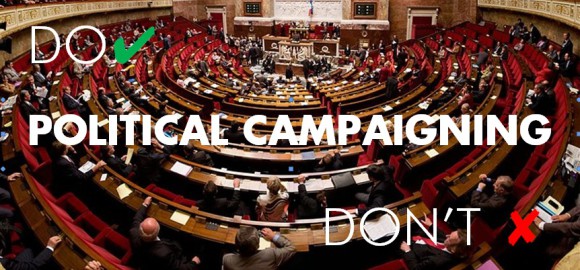
Do's and Don'ts of political campaigning

Andrzey Felczak (Austria –Radlobby), Klaus Bondam (Denmark, Danish Cyclists’ Federation) and Burkhard Stork (Germany, ADFC) have provided us with a few tips and tricks for effective political campaigning. There are a few do’s and don’ts that ought to be respected so that your association achieves its goal in shaping policy.
DO
Be visible
You must be on-stage well before the campaign; people need to recognise you as a credible presence.
Be continuous
By working in continuity, you are ensuring a lot of work is done beforehand. Politicians need to have a good grasp of your proposals before “it gets serious”.
Want to save this for later?
Be realistic
Cycling isn’t the main topic, and it doesn’t win elections.
Talk to everyone
If you have the time, talk to everybody that you want to talk to you. Even if you don’t share many points of view you can place some good facts.
Be strategic
Try to pick the “low hanging fruit” first, and identify politicians that are or can be your allies. Try to build up a personal relationship with them (meetings, invitations to events, engaging in his/hers social media platforms etc.)
Feed the facts
Support your allies with facts or make suggestions for improvements that they can profit from. This will help you a lot when you need something from them.
Check the facts
Be sure that you provide the politician with facts. It’s deadly for a politician to be caught with ‘wrong numbers’.
Wait for the right moment
Be prepared and patient and wait for your “window of opportunity”. Many things can only be achieved if you act in the right moment.
Be transparent
All solutions that you put forward must be public beforehand.
Be patient
Understand the structure and the timeframe that a politician has to work within. Do respect the speed – or lack of speed – of ‘the system’.
Be trustworthy
Be discreet and loyal. It’s the only way that you obtain trust and get useful information in advance or are engage in his/hers development of policies.
Be kind in the press
Be positive in the press towards a politician. They love when others talk with kindness and fondness about them.
Be vocal in your approval
Honour politicians when they do something good. They receive approval so seldom that this has a large effect
DON’T
This will drastically decrease your chance of success. In public or in private, regardless: there are ‘ears’ everywhere.
Be unrealistic
Be demanding, but don’t be unrealistic. This would decrease your credibility and you’ll lose politicians’ attention.
Limit your outreach
Don’t concentrate on one party only even if you share many point of views with them. This would cause you getting a party image, damaging your independence and credibility.
Be indiscreet
No politician likes to be quoted from confidential dialogue. They do not want their political opponents to obtain the information that they may have given to you.
Bash politicians
No politician likes to be bashed too much in public. It makes them look ridiculous
Be offensive
Don’t be rude or offensive when you contact them, or even when you talk about them.
Be forgetful
Don’t leave them out by forgetting to invite them for opening of events. And don’t neglect them. They want an ongoing stream of information coming from you. This is what makes you look like a serious counterpart.
Be intransigent
Don’t be unreasonable in your demands. Be willing to compromise – and do understand the space that the politician must manoeuvre within.
Be experimental
Push for the tried, the tested. Politicians want solid proposals backed up by science and research
- Log in to post comments
Contact the author
Recent news!
Upcoming events
Contact Us
Avenue des Arts, 7-8
Postal address: Rue de la Charité, 22
1210 Brussels, Belgium









